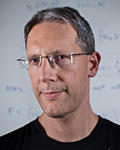Quantum Algorithmic Breakeven: on Scaling Up with Noisy Qubits
Category
Published on
Abstract
As quantum computing proceeds from perfecting physical qubits towards testing logical qubits and small scale algorithms, an urgent question being confronted is how to decide that critical milestones and thresholds have been reached. Typical criteria are gates exceeding the accuracy threshold for fault tolerance, logical qubits with higher coherence than the constituent physical qubits, and logical gates with higher fidelity than the constituent physical gates. In this talk I will argue in favor of a different criterion I call "quantum algorithmic breakeven," which focuses on demonstrating an algorithmic scaling improvement in an error-corrected setting over the uncorrected setting. I will present evidence that current experiments with commercial quantum annealers have already crossed this threshold. I will also discuss our latest evidence for a “limited quantum speedup” with such devices. The lessons we have learned from experimenting with commercial devices with many noisy qubits will hopefully inform other approaches to quantum computing.
Bio
 Daniel Lidar is the Viterbi Professor of Engineering at USC, and a professor of Electrical Engineering, Chemistry, and Physics. He holds a Ph.D. in physics from the Hebrew University of Jerusalem. He did his postdoctoral work at UC Berkeley. Prior to joining USC in 2005 he was a faculty member at the University of Toronto. His main research interest is quantum information processing, where he works on quantum control, quantum error correction, the theory of open quantum systems, quantum algorithms, and theoretical as well as experimental adiabatic quantum computation. He is the Director of the USC Center for Quantum Information Science and Technology, and is the co-Director (Scientific Director) of the USC-Lockheed Martin Center for Quantum Computing. Lidar is a recipient of a Sloan Research Fellowship, a Guggenheim Fellowship and is a Fellow of the AAAS, APS, and IEEE.
Daniel Lidar is the Viterbi Professor of Engineering at USC, and a professor of Electrical Engineering, Chemistry, and Physics. He holds a Ph.D. in physics from the Hebrew University of Jerusalem. He did his postdoctoral work at UC Berkeley. Prior to joining USC in 2005 he was a faculty member at the University of Toronto. His main research interest is quantum information processing, where he works on quantum control, quantum error correction, the theory of open quantum systems, quantum algorithms, and theoretical as well as experimental adiabatic quantum computation. He is the Director of the USC Center for Quantum Information Science and Technology, and is the co-Director (Scientific Director) of the USC-Lockheed Martin Center for Quantum Computing. Lidar is a recipient of a Sloan Research Fellowship, a Guggenheim Fellowship and is a Fellow of the AAAS, APS, and IEEE.
Sponsored by
Cite this work
Researchers should cite this work as follows:
Time
Location
Burton Morgan, Room 121, Purdue University, West Lafayette, IN